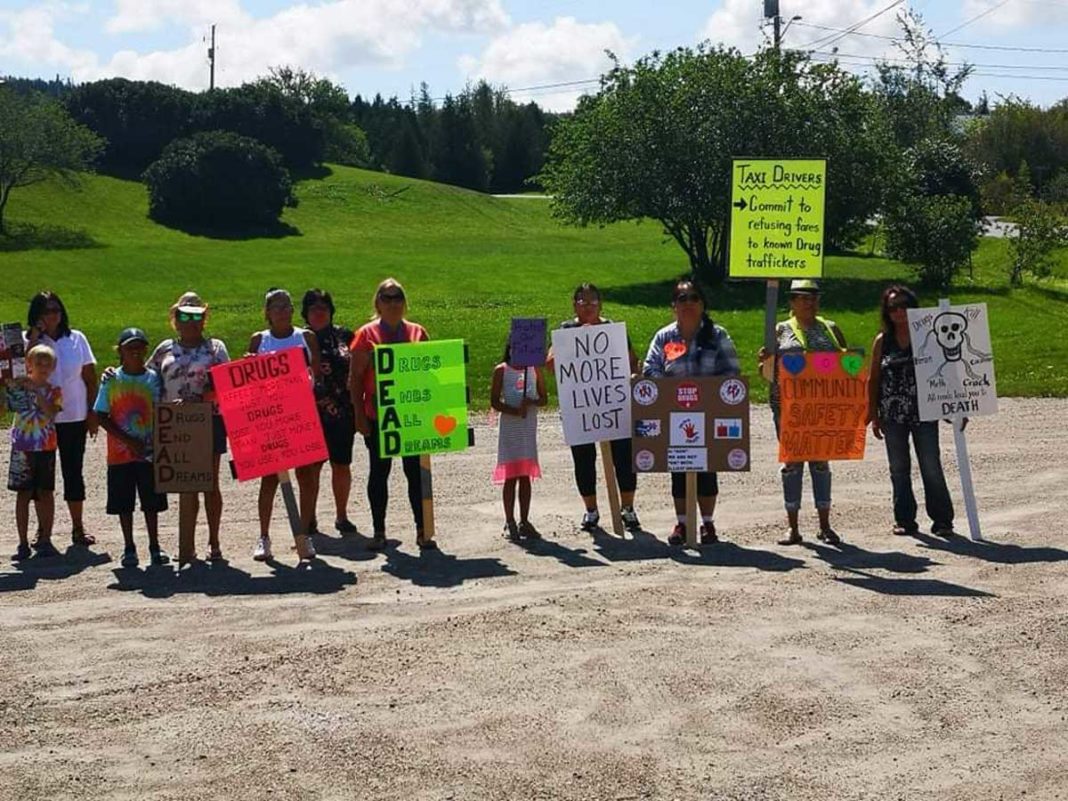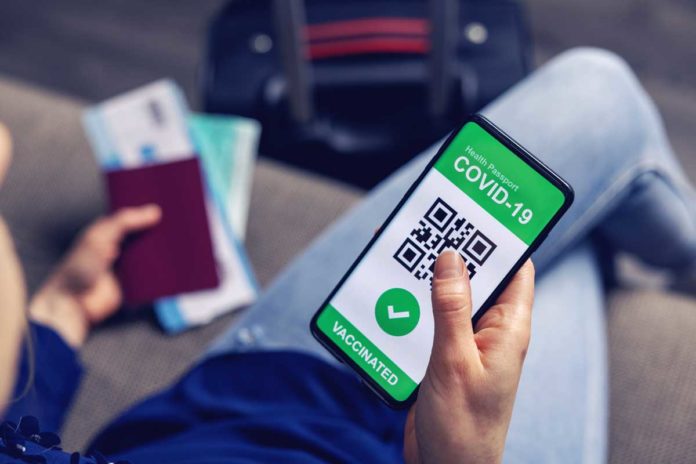AUNDECK OMNI KANING—Aundeck Omni Kaning First Nation (AOK) member Paula Kakekagumick wants to raise her children in a safe community and she says has had enough of illicit drug trafficking in AOK. She put out a call to mothers and grandmothers to participate in a peaceful demonstration on August 31. A group of approximately 25 supporters met at the Elders Centre parking lot at 1 pm, with 15 continuing on a small march from the band office to the fire department and back.
“There are known dealers in the community who are not band members but who are living here and selling drugs out of band member homes,” explained Ms. Kakekagumick. “This is more or less what told me to do the rally. I’m saying, what can we do?”
She questioned why the residency bylaw was not being enforced.
It’s complicated, said Ogimaa Patsy Corbiere, who participated in the rally. There are trespassing laws that apply and processes to follow. “What Paula was doing was trying to increase awareness in our own community of what is actually coming here. There are people coming here and there is crack selling and cocaine selling. We’ve got opioids and crystal meth here. The issue is trying to make people aware that this is a problem.”
Ogimaa Corbiere has been dealing with the issue since she became chief but the issues are becoming harder to deal with, she said. “We’re getting younger and younger people on these types of drugs. Not cannabis, it’s the opiates and the other pills they’re on. It has become a tragedy. Look around the Island and see how many people have actually died. There’s also alcohol addiction. It’s not something to be proud of but Manitoulin Island has the highest percentage of alcohol use in Ontario. That’s not something to brag about.”
“I work with the police directly every day,” Ogimaa Corbiere said. “The same as (M’Chigeeng First Nation) Ogimaa Linda Debassige. We want to stop the drug problem and the drug ring that’s going on. UCCM Police, Wikwemikong Tribal Police and the OPP are partnering. They’re looking at how they’re going to tackle the drug problem because the same guys we’re dealing with in the UCCM Police service area are in the other communities. It’s getting to be a success with more collaboration.”
What doesn’t help is calling the band office instead of police to report incidents. There have been a lot more calls coming into the band office related to increased drug and other illegal activity, said Ogimaa Corbiere. “A lot of people don’t want to get involved by reporting something to the police.”
A community newsletter was sent out that explained how to report a crime. “If you’re going to call and say someone is doing drugs or selling drugs in your house, the police are going to ask ‘what kind of drugs? How do you know?’ They’re going to ask questions so we laid it out a little bit.” All council members signed the flyer, “because the onus on protecting the band is coming through the whole council,” she said.
The community notice was one thing Ms. Kakekagumick had asked council to do. “Let the people in the community know what’s happening here. Because of our request to hold the rally, they sent out their notice. It lists all the information you’re supposed to collect to submit to police. Police tell us to submit tips but unless you see it first hand, it’s just hearsay. The plea has to go out to the neighbours of the drug dealers when something is happening, because they’re the ones who see the people coming and going.”
At the rally, a community member who asked to remain unnamed said she had some lived experience. “It destroys,” she said. “It’s surprising how quickly you can go down. I’ve almost been there myself.” She supported the rally and hoped that the people who are using drugs “turn around before it’s too late.”
She said calling police is a hard decision to make. “To be honest, if I was in that situation, it’s the fear of being hurt or someone coming after your family members.” Ms. Kakekagumick agreed. “That’s what I felt when I first started planning this.” Some people even refused to participate in the rally because they were afraid of being seen doing so.
There have been drug awareness and other programs offered to youth and community members, said Ms. Kakekagumick. “AOK is very advanced in health and other programming. I don’t think there’s a lack in awareness or programming. We’re not underfunded. It’s defining who can live here and doing something about it.”
“We have seen an increase in people stealing and can’t leave anything outside anymore because it goes missing,” said Jenny McGraw, who helped coordinate the rally. She runs AOK’s Youth Alcohol and Drug program. Her catchment group actually reaches up to the mid-fifties age group. She thinks the opioid crisis and the pandemic are walking hand in hand and blames the government for what is happening, with Canada Emergency Wage Benefit (CERB) having a “big hand” in what is happening in First Nations communities. She believes the drug problem has escalated in the past year, since the beginning of the COVID-19 pandemic and in particular with the start of the CERB benefit. Assaults are increasing and more property is being stolen, she said.
“They made CERB available and people could apply just like that and get the money. A handful of our community members collected the CERB and became addicted because they had so much free money.”
It’s frustrating for her. She said people in other communities have seen the same thing happening. “Not only are these folks addicted, but now they’re going to have to pay back money that they never should have gotten in the first place. They were already people that were on the poverty line. It’s horrible. It’s a vicious cycle.”
Ms. McGraw said events like the rally are positive because they create awareness. “It lets other people know that some of us are not okay with this. We are not happy with the status quo. We’re not just turning a blind eye to what’s going on.”
AOK is fortunate in that it has not yet had a death of a band member, she said. “We’ve had a death of an associated person. We’ve had plenty of overdoses. Plenty. It’s just a matter of time. Every time it’s welfare day or child tax benefit day, when my phone rings on those mornings, it’s my greatest fear that I’ll hear we’ve lost a community member.”
Sadly, she does not feel that a death would have much of an impact. “Addiction is addiction. You have people that are stealing from their friends and have no qualms about it. The other thing is they really do think they’re invincible. They have Narcan, but how are they going to use it if they’re not with anybody?”
“I really don’t know what the answer is going to be,” said Ms. McGraw. “But I know that these drugs are not from here. They’re being brought here.”
Ogimaa Corbiere pointed out the rally was held on Overdose Awareness Day. “In AOK we’re lucky that we haven’t really had any. The issue is the potential. This is becoming a major problem but we stand together with all our First Nation communities and the municipalities to address it. We have people coming from other urban centres bringing drugs into the community and we’re in the midst of COVID on top of that.”
The important thing is the future of the children, she added. “Kids as young as 12 are using drugs. That’s the problem. What can we do better to help these people? We’re not going to give up on anybody.”






